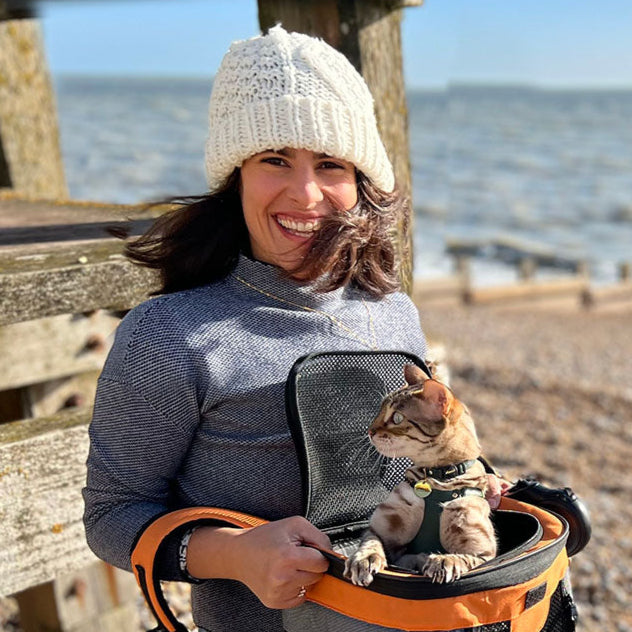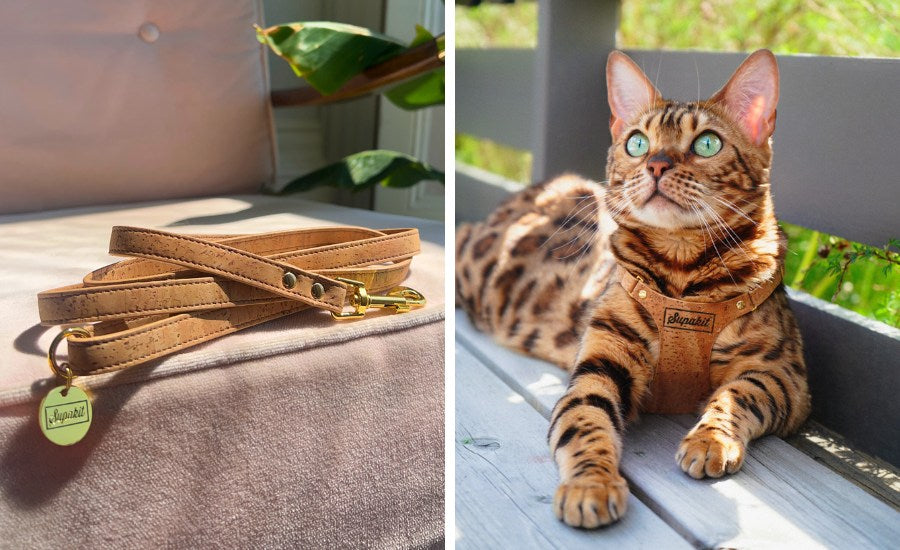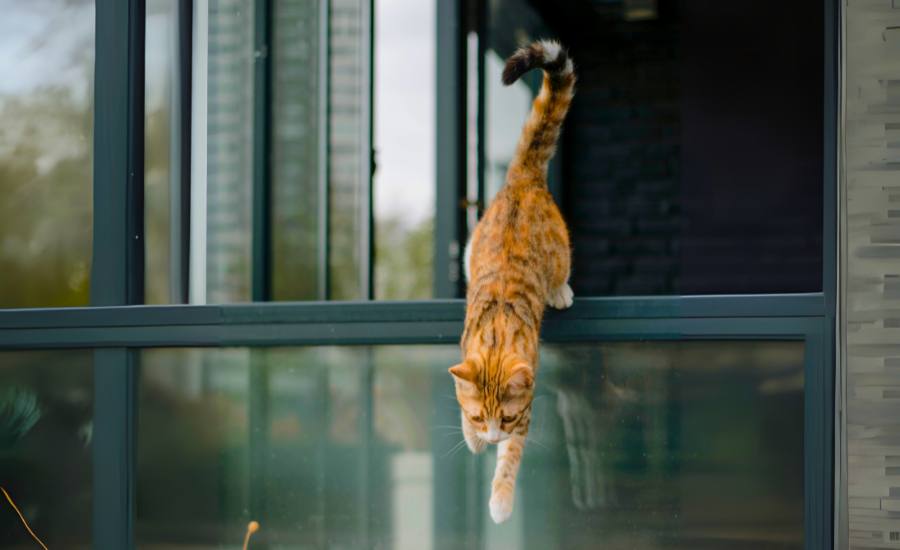What Have You Always Wanted To Ask A Vet? - With Dr Alex Avery
In the first of our brand new #catchat series, featuring cat owners, experts and adventurers, Dr Alex Avery of Our Pets Health answered all the burning questions you had about your kitties! We loved hearing Dr Alex’s answers and learnt a lot - and we hope you all did too!
We’ve put together the creme de la creme below, but if you’d like to see the full CatChat in all its glory, head over to our Instagram post here.
Our Superhero Vet, Dr Alex Avery

By his own admission, Dr Alex Avery is a big fan of four-legged furry family members - and, more importantly, believes that no matter where you live or how much money you have, your pet deserves for you to have access to a reliable, evidence-based source of pet health information. And that’s where Dr Alex comes in!
Dr Alex is on a mission to spread awareness of how to take care of your feline friend in the best possible way, preventing healthcare issues before they need costly vet interventions. He runs Our Pets Health - a super-extensive collection of articles, podcasts, guides and everything you could possibly want to know about looking after your pets!
Before we jump into our CatChat to answer your most burning questions, we had some of our own questions for Dr Alex…
What do you love most about being a vet?
"Forming long term relationships with my patients and clients."
How did you get into being a vet?
"I chose the veterinary profession late compared to a lot of vets. I always loved the sciences at school and also knew I wanted to do something practical rather than office-based. At about 16 years old, after doing some work experience with dentists and doctors, I went to the local vet clinic to see what they got up to and never looked back!"
What do you think a veterinarian's role is in the community?
"Education, education, education! Specifically, the importance of preventive health."
How and when did you realise that being proactive in noticing pet's behaviour could help prevent diseases in the early stages itself?
"That awareness has always been there and it is one of the most frustrating and challenging things I face when an individual is only brought to see me when they have been unwell for a long period of time. Unfortunately, at this point it is often too late to make as much of an impact in their lives when compared to the potential to help earlier in their illness."
What are the most commonly observed behaviours/actions that could be dangerous for pets?
"Ignoring seemingly small signs that a problem could be developing and so delaying seeking help."
Why do you believe money shouldn't play a huge role to keep a pet healthy?
"Because maintaining health is all about putting in some simple management or care strategies to help avoid the most common conditions and diseases I see every day in the veterinary clinic. It is treating the consequences of ignoring these simple preventive strategies that are costly. For example, the simple fact of being overweight is estimated to cost a cat owner an average of $1178/year! The reason I produced my free guide “Pet Health Essentials” is to help raise awareness of how easy a prevention focus can be."
What is most challenging about what you do?
"Online, it is raising awareness of issues that pet parents don't know are important. As a content producer, I rely on search engines to reach new pet parents, and if they are not searching for a specific topic then it is hard to raise awareness about its importance!
As a practicing vet, the biggest challenge is trying to provide the best care possible when there are often severe money restrictions. this challenge is though, also one of the most rewarding aspects of the job!"
What's your number 1 tip for new cat owners?
"Simple, if you focus on nothing else, keep your cat a healthy weight!"
You can find out more about Dr Alex and his brilliant work here:
- Visit Dr Alex's website
- Listen to his 'Call the Vet' Podcast
- Check out his YouTube channel
Related post: 'Maintaining A Healthy Weight For Your Cat'
Your Cat Questions Answered

Q: I am moving house in a few weeks and my cat, Maizy, is already getting stressed with all the boxes and changes in her environment. What can I do to keep her calm and help her settle into our new home?
Dr Alex Avery: Moving house is stressful for everyone! I hope it goes smoothly. For Maizy, Feliway can make a really big difference and a diffuser is ideal if you confine her to a single room in the new house. There are also supplements you can try, like Zylkene and Calmex, that can help to reduce the feeling of stress. Also, making sure that your cat has places to escape to and hide if she’s feeling particularly anxious can help too.
Related posts: 'Moving House With A Cat: How To Have A Cat Friendly Move' and 'How To Use Catnip To Make Your Cat A Happy Cat'
Q: My cat keeps licking the base of his tail. He over-grooms when he’s stressed or bored, but seems to be focusing on his tail a lot lately. What can I do?
Dr Alex Avery: Focusing on the base of the tail alone can mean a problem with your cat’s anal glands, or fleas. It’s best to take him to the vets to have a proper check, and they’ll be able to help if there are any problems. However, if, as you say, he has a tendency to over-groom often, then I’d suggest focusing on reducing any new stress and ensuring he has access to stimulating toys and regular play sessions, as well as puzzle feeders and food toys to keep him occupied.
Q: My cat has been taking longer than usual to pee in the litter box, but there have been no signs of straining and we’re able to see that they’ve been able to go. Could this be the first sign of something wrong?
Dr Alex Avery: In this case, cystitis is a definite possibility. In cats, cystitis is usually not caused by an infection and is actually more likely to be related to stress. I would suggest getting him checked over by your vet, as male cats in particular have a chance of their bladder becoming blocked, which can be life-threatening. In the meantime, increasing your cat’s water intake is important to try to flush out the bladder. If your cat isn’t producing any urine, or only a few drops, seems to have pain in their abdomen, or is unwell in any other way, then he should be checked over by a vet ASAP.
Q: What does a good, homemade cat diet consist of?
Dr Alex Avery: I always recommend that if you want to formulate a truly balanced home-cooked diet, it’s best to consult with a qualified nutritional specialist as it has been shown time and again that the vast majority of home-prepared diets are not truly balanced. This also means that the nutritionist can cater for any special dietary requirements your cat has.
Q: How do I stop my cat peeing on the laundry, and sometimes the bed? He’s 1 ½ years old, the only male cat in the household, and he’s fixed. I clean really well with enzymatic cleaners to try to stop him from doing it again and I use pheromone sprays and diffusers that are supposed to discourage this behaviour. There are several litter boxes around the house that are cleaned daily. What else can I do?
Dr Alex Avery: This is certainly a frustrating problem to be dealing with! When you’ve tried everything else, as it seems you have, I often recommend going back to the start and making sure there’s no underlying issue that needs solving, like cystitis or crystals. A urine sample check at your vet’s would be a great first start here. Some other considerations for you would be to move the trays to where he is regularly spraying, and then very slowly move them back to where you want them. Also, make sure that the litter trays are in quiet, private locations where your cat can’t be crept up on - the corners of rooms is often a good spot. Sometimes, cats prefer non-clumping, scent-free litter, and you can also supplement their diet with Zylkene or Calmex to reduce stress. It might also be worth considering switching to a specific urinary stress diet. Good luck!

Q: Cat nails: should they be trimmed or maintained, or do they do it themselves?
Dr Alex Avery: A great question! An active healthy cat or kitten will normally keep their nails the perfect length themselves, through their normal activity and scratching behaviour. As a cat ages, though, they will often become less active and arthritis is a very common (but often unrecognised) disease that will limit their scratching behaviour. Old cats will need their nails clipped more often than not - I do occasionally see older cats whose nails are so long they are growing around and into their paws! To trim your cat’s nails, I like the small scissor-style cat nail clippers and it’s important to replace them if they become blunt. Handling your cat’s feet when they are you will mean they are much more comfortable with having their nails trimmed as they get older.
Q: As a vet, how do you feel about taking your cat outside on a leash? Are there any specific things to take into account?
Dr Alex Avery: I think it’s a great idea if you want to give your ‘indoor’ cat some great mental stimulation and exercise, or if you want to go exploring further afield with them. I have a few patients who come to see me on a harness and lead rather than in a carrier. A couple of important points to bear in mind: if your cat is timid, it’s likely something that will only super stress them out, so it’s important to work with your cat and gently introduce them to the harness and the great outdoors, taking things very slowly. As far as harnesses go, I’d say comfort and security are important, so something that your cat will hardly notice but that they won’t be able to easily slip out of and won’t break if they panic (the Supakit store would be a great place to start!). Carrying a collapsible carrier is also something to consider, so that you can keep them safe if they really freak out. I’d also recommend making sure your cat is microchipped and your details are all up-to-date on the national register, so if the worst does happen you can be reunited.
Q: When introducing a new cat into an existing home, how important is gender? Should I stick to the same gender to avoid sexual behaviour between them?
It only likely makes a difference if they are kept entire (not neutered or spayed), which needs a huge amount of management unless you are going for all females - not something I’d recommend. Otherwise, it doesn’t make a huge difference. The important thing is to keep the cats apart in different rooms to begin with, then switch rooms so they get used to the smell of each other. You can feed them either side of a door so their stronger scent has a positive association. Introduce in the same room for short periods, but keep them distracted with toys and treats. Make sure the number of litter trays, food and water stations has increased. The general recommendation is one more of each than the number of cats in the house. Lastly, if you have a harmonious household then adding another cat can upset the apple cart, so be sure it’s the right option for you all before going ahead.
Related Post: 'Male vs Female Cats'
Q: I have 2 indoor cats (brother and sister), who have just turned 1. I make a point of playing with them daily for about 20 minutes. They eat wet and dry food and have no health issues. However, one of them is becoming quite lazy and is getting fatter and fatter. Should I put him on a diet? Which food would you recommend?
Dr Alex Avery: Firstly, well done for recognising weight as a massively important issue. You’re right that while exercise is certainly important, the food bowl is the key to solving the problem. To start with, never leave food down all the time. Next, for an overweight cat, you need to feed about 15-20% less than the amount recommended to feed them if they were their ideal weight. This should be weighed out so you know exactly what your cat is getting. With cats, you also need to be careful they don’t lose weight too rapidly, as it can cause serious issues (especially if they are really overweight). A lot of vets run nurse weight loss clinics and I strongly recommend trying one of these for the best chance of success. As far as diets for weight loss go, there are lots of options but my first choice tends to be Hills Metabolic. With 2 cats, you can either keep them separate at mealtimes, or use microchip feeding bowls to make sure neither is helping themselves to their sibling’s food!
Q: Is it harmful for cats to vomit? My cats vomit hairballs every now and then (which I try to control with frequent brushing), but they also like to eat grass which they then vomit up - is this harmful to them?
Dr Alex Avery: In general, no. It’s not harmful if hairballs are the cause of the vomiting and it’s not overly regular. You can try adding some paraffin-based laxative to your cat’s diet, which can help clear hair to prevent vomiting. They come in flavours that cats tend to love - mine certainly do! Eating grass is a normal behaviour too, so it can actually be a good idea to have some cat-friendly grasses available, even for an indoor cat to chew from time to time. The thought is that the grass in some way helps naturally with parasite control.
Our next #CatChat...
We’re incredibly grateful to Dr Alex for taking the time to answer all your feline questions! We certainly learnt a lot!
If you’re interested in our next expert CatChat, make sure you’re following us on Instagram to be the first to hear… We’ve got some awesome experts lined up and we can’t wait to chat with you all again!







